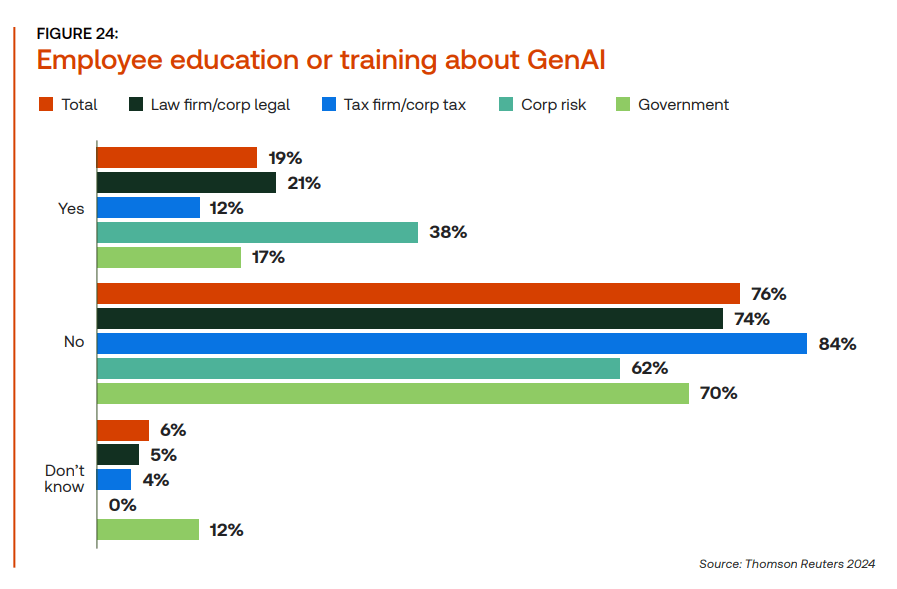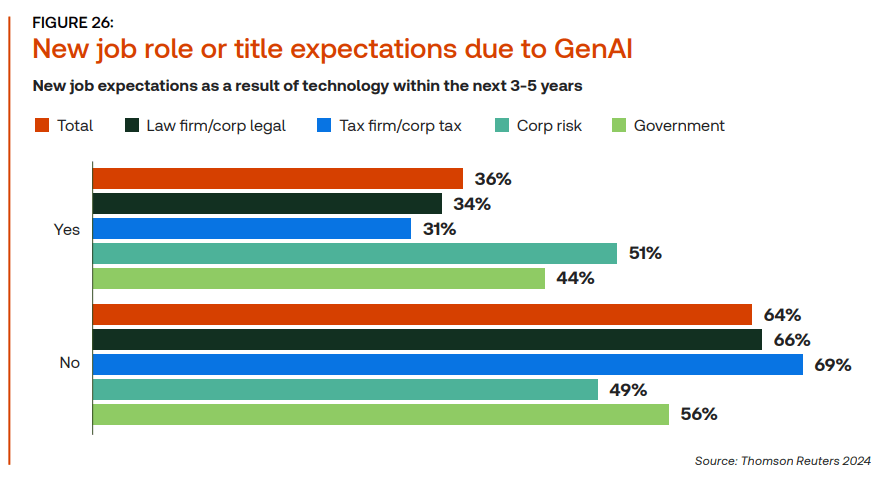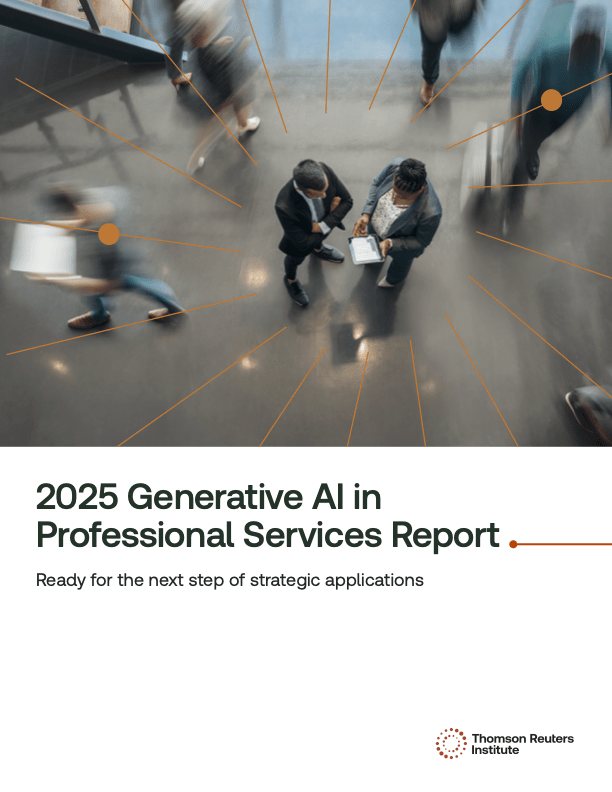Generative AI (GenAI), once a futuristic concept, is here and reshaping the professional landscape across service industries like legal, risk and fraud, and government.
The professionals surveyed in the Thomson Reuters Institute’s 2024 Generative AI in Professional Services report demonstrated while adoption isn’t yet widespread, more than half of professionals believe they should use GenAI in their daily work — and they’re already planning for the specialized tools that will create this reality.
As generative artificial intelligence (GenAI) continues to make its presence felt across various professional services, the future of work is poised for significant transformation. Delve into the current state of GenAI training, the emergence of new job titles, and how legal, government, and risk professionals should prepare for future expectations.
Jump to ↓
| The current state of GenAI training |
| The future of GenAI training |
| How industry professionals should prepare for expectations |
| What to look for in an AI assistant |
The current state of GenAI training
One of the critical steps organizations are taking to prepare for the GenAI revolution is educating their staff on the proper use of this technology. Despite the growing interest and potential applications of GenAI, the current state of training in this technology is relatively underdeveloped.
According to the Thomson Reuters Institute’s 2024 report on GenAI in professional services, only 19% of total respondents indicated that their organizations provide GenAI training. Specifically, 21% for legal, 17% for government, and a high 38% for the risk industry ahead of GenAI training.

Despite the evident need for GenAI training, many organizations have yet to prioritize this aspect. Many industries have stated that job applicants with GenAI skills are “nice to have” or not planning to target GenAI-skilled applicants but that it will not be a necessarily a requirement. This lack of training can be attributed to several factors:
- Uncertainty and reluctance: Many professionals are still uncertain about the implications of GenAI and are hesitant to fully embrace it. This hesitance can lead to a delay in implementing training programs. This hesitance stems from concerns about the technology’s accuracy, data security, and potential over-reliance on AI. As a result, companies may be reluctant to invest in training until they are more confident in the technology’s reliability and benefits.
- Resource allocation: Developing and delivering comprehensive GenAI training requires significant resources, including time, money, and expertise. Some organizations may lack the necessary resources to invest in such training.
- Shortage of GenAI experts: There is a shortage of professionals with the expertise to train others in GenAI. This gap makes it challenging for organizations to develop and implement comprehensive training programs. The fast-paced evolution of GenAI technology can make it challenging for organizations to keep up with the latest developments and incorporate them into their training programs.
The future of GenAI training
The future of GenAI will be shaped by several key players, with technology companies and corporations expected to be the primary influencers. According to the report, 72% of respondents identified technology companies as the top influencers, followed by corporations (52%) and government regulators (32%).
Technology companies are at the forefront of AI research and development, driving innovation and setting industry standards. However, corporations were also identified as significant influencers, with respondents recognizing their impact on the future of GenAI. These businesses are not only potential users of GenAI technology but also contributors to its development and refinement through their substantial investments and practical applications.
Interestingly, respondents from specific sectors, such as law firms and court systems, also viewed their own industries as potential influencers. Law firms, for example, were seen as likely to influence the future of GenAI due to their growing adoption of AI tools for legal research, document review, and contract drafting. Meanwhile, court systems and government regulators were considered influential due to their role in setting legal and ethical standards for AI usage.
New jobs to emerge
As GenAI becomes more integrated into professional services, new job roles are expected to emerge to support its implementation and ongoing maintenance with 36% of all industries saying that they expect entirely new titles or job expectations to arise within the next 3-5 years from increased GenAI usage.

The report identifies several potential new job titles:
- AI Implementation Coordinator: These professionals will oversee the integration of AI technology into organizational workflows, ensuring that AI tools align with business objectives.
- IT Support: With the increased reliance on AI technology, there will be a greater need for IT support staff to manage and troubleshoot AI-related issues.
- Technology Consultant/Specialist: These roles will involve advising organizations on the best AI tools and practices to adopt, helping them navigate the complexities of AI technology.
These roles will focus on the oversight and integration of GenAI tools, ensuring that these technologies are used effectively and ethically within existing workflows.
How industry professionals should prepare for expectations
As GenAI continues to evolve, professionals in the legal, tax, and risk sectors must prepare for the changes it will bring. Rather than viewing GenAI as a replacement for human expertise, professionals should consider it a complementary tool that can enhance decision-making and productivity. Strategic implementation of GenAI can lead to more efficient processes and improved outcomes in complex tasks. Here are some strategies these professionals can adopt to stay ahead of the curve.
Legal professionals
Legal professionals must prepare for a future where GenAI plays a significant role in their work. The report highlights several areas where GenAI can be applied, including legal research, document review, and contract drafting. To prepare for these changes, legal professionals should:
- Continuous learning and training: Legal professionals should prioritize ongoing education in GenAI technologies. Law firms should invest in training programs to ensure their staff are proficient in using these tools as GenAI continues to grow.
- Stay on top of advancements: Legal professionals should stay informed about the latest advancements in GenAI and actively seek opportunities to integrate these technologies into their workflows. his includes understanding issues related to data privacy, accuracy, and the potential for AI to perpetuate biases. This proactive approach will help them stay competitive, be ethical, and provide higher-quality services to their clients.
- Focus on high-value tasks: By leveraging GenAI for routine and repetitive tasks, legal professionals can focus on high-value activities that require human judgment, creativity, and critical thinking. This includes understanding how AI tools can be used for legal research, drafting, and case management. This shift will enhance their overall efficiency and effectiveness.
Government professionals
Government professionals, particularly those in legal departments and court systems, have shown more hesitance towards GenAI adoption. However, they can still prepare for the future by:
- Developing clear policies: Government organizations should establish clear policies and guidelines for GenAI use. These policies should address data security, privacy, and ethical considerations to ensure responsible and compliant use of the technology.
- Collaborating with technology companies: Government agencies can benefit from partnerships with technology companies to develop and implement GenAI solutions tailored to their specific needs. These collaborations can provide valuable insights and resources for successful GenAI adoption.
- Fostering a culture of innovation: Encouraging a culture of innovation within government organizations can help overcome resistance to change. By promoting the benefits of GenAI and providing support for its adoption, government professionals can better prepare for the future.
Risk professionals
Risk professionals are among the most enthusiastic adopters of GenAI, with many already using or planning to use the technology for tasks such as risk assessment and reporting. To further prepare for the future, risk professionals should:
- Enhance data skills: As GenAI relies heavily on data, risk professionals should focus on enhancing their data analysis and risk management skills. GenAI can enhance risk assessment and fraud detection by analyzing large datasets and identifying patterns that may indicate fraudulent activity. This and their expertise will enable them to effectively leverage GenAI for risk assessment and decision-making.
- Implement security measures: With the increased use of AI, data security becomes even more critical. Risk professionals should ensure that AI tools comply with data protection regulations and implement robust security measures to safeguard their business and sensitive information.
- Be informed of regulations: As GenAI adoption grows, regulatory frameworks are likely to evolve. Risk professionals should stay informed about these changes and ensure their organizations remain compliant with new regulations.
What to look for in an AI assistant
The future of work in the era of GenAI presents both opportunities and challenges for legal, government, and risk professionals. By investing in training, adopting a proactive approach, and focusing on high-value tasks, these professionals can effectively prepare for the transformative impact of GenAI. As new job titles emerge and technology companies continue to influence the development of GenAI, staying informed and adaptable will be key to navigating this evolving landscape.
In determining the most beneficial GenAI tool, they’ll want to ensure that the AI assistant’s developer has experience in or at least demonstrable knowledge of the industry professional’s field. A truly valuable AI assistant should access reliable information when the professional’s needs involve trends, data, and other types of research.
An AI assistant, and the company providing it, should also be able to prove that the tool will become even more helpful, accurate, and efficient in the future, evolving as one’s profession evolves. A question any industry professional should ask should be, will this tool help me uncover insights and meet challenges for situations that have yet to arise?
Public vs private AI
All this noted, there is a distinction between public AI and private AI. The main difference is that public AI scrapes the entire internet for research and data. As a result, a public GenAI tool may inadvertently access and make use of false information, private data, or material under copyright—major risks for any profession. By contrast, private AI uses “proprietary” databases that have been developed to access specific and trusted sources of data and research.
Choosing the right solution
Not all AI tools are created equal. Legal, government, and risk professionals must conduct thorough research to minimize their exposure to potential industry AI risks. With Thomson Reuters’ CoCounsel, these industry professionals can do just that and more.
- Rapidly understand complex documents and find critical information by asking CoCounsel questions and receiving thorough and nuanced answers.
- Get relevant answers to your legal questions with AI-assisted research that taps into Practical Law and Westlaw content and expertise to make better-informed decisions.
- Pinpoint key information that could be scattered across thousands of documents by simply asking CoCounsel and easily share information across your organization.









